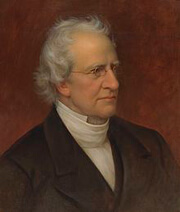Bible Commentaries
Charles Hodge Commentary on Romans, Ephesians and First Corinthians
Charles Hodge (December 27, 1797 - June 19, 1878) was an important Presbyterian theologian and principal of Princeton Theological Seminary between 1851 and 1878. He was a leading exponent of the Princeton theology, an orthodox Calvinist theological tradition in America during the 19th century. He argued strongly for the authority of the Bible as the Word of God. Many of his ideas were adopted in the 20th century by Fundamentalists and Evangelicals.
Hodge wrote many biblical and theological works. He began writing early in his theological career and continued publishing until his death. In 1835 he published his Commentary on the Epistle to the Romans, which is considered to be his greatest exegetical work. Other works followed at intervals of longer or shorter duration - Constitutional History of the Presbyterian Church in the United States (1840); Way of Life (1841, republished in England, translated into other languages, and circulated to the extent of 35,000 copies in America); Commentary on Ephesians (1856); on First Corinthians (1857); on Second Corinthians (1859). His magnum opus is the Systematic Theology (1871-1873), of 3 volumes and extending to 2,260 pages. His last book, What is Darwinism? appeared in 1874. In addition to all this it must be remembered that he contributed upward of 130 articles to the Princeton Review, many of which, besides exerting a powerful influence at the time of their publication, have since been gathered into volumes, and as Selection of Essays and Reviews from the Princeton Review (1857) and Discussions in Church Polity (ed. W. Durant, 1878) have taken a permanent place in theological literature.
This record of Hodge's literary life is suggestive of the great influence that he exerted. But properly to estimate that influence, it must be remembered that 3,000 ministers of the Gospel passed under his instruction, and that to him was accorded the rare privilege, during the course of a long life, of achieving distinction as a teacher, exegete, preacher, controversialist, ecclesiastic, and systematic theologian. As a teacher he had few equals; and if he did not display popular gifts in the pulpit, he revealed homiletical powers of a high order in the "conferences" on Sabbath afternoons, where he spoke with his accustomed clearness and logical precision, but with great spontaneity and amazing tenderness and unction.
Hodge's literary powers were seen at their best in his contributions to the Princeton Theological Review, many of which are acknowledged masterpieces of controversial writing. They cover a wide range of topics, from apologetic questions that concern common Christianity to questions of ecclesiastical administration, in which only Presbyterians have been supposed to take interest. But the questions in debate among American theologians during the period covered by Hodge's life belonged, for the most part, to the departments of anthropology and soteriology; and it was upon these, accordingly, that his polemic powers were mainly applied.
All of the books that he authored have remained in print over a century after his death.







Comments